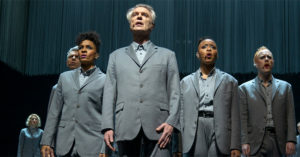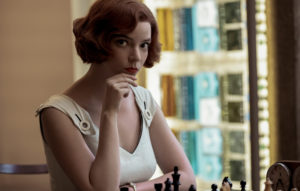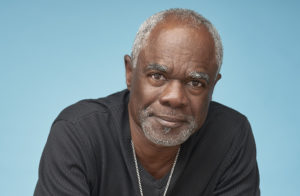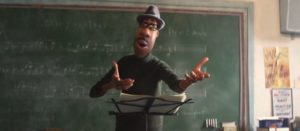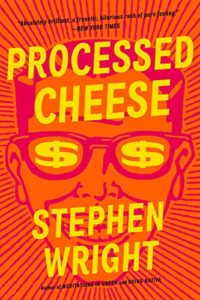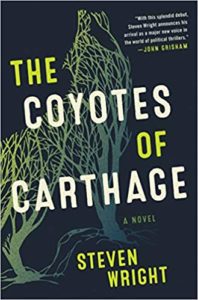Just so you all know: I had a tougher time than usual with my annual everything-but-jazz list and not for the reasons you think. There was an awful lot that gave me comfort and joy in the past year because what else did I or anybody else have to do in 2020 but seek such things whenever they could be found. So I left a lot of things I could have included to the side. But I don’t regret anything I retained because the main point for me is to let you know that I recognized and embraced the same things you did and also found out stuff that you may not know about, but need to. So here we go and sorry if I missed something. Chances are I didn’t. But because I once again reside in the global capital of It Is What It Is (a.k.a. Philadelphia), I’m in no position to regret anything here. Next year? That’s next year. For now…in no particular order…
American Utopia – I saw it live in January on one of its last pre-lockdown Broadway performances and again this fall as a Spike Lee movie. The whole bouncy, juicy enterprise is just as you’ve heard: an invigorating, beautifully staged tonic for nerves frayed and hopes stressed by the previous four years (if not longer). Yet for all the show’s ecumenical uplift and big-tent benevolence, I couldn’t help but think back to its producer-writer -star’s early life as a Talking Head. And by “early,” I mean all the way back to Talking Heads ’77 and such lines from that long-ago breakthrough as: “Other people’s problems/They overwhelm my mind/They say compassion is a virtue/But I don’t have the time.” Of course, David Byrne’s a different person from whatever or whoever he was back then, as am I. And I’d like to think he now wonders sometimes, as I do, whether the spirit animating that chorus from “No Compassion” is in any way partly responsible for whatever culminated over the intervening decades into a Donald Trump administration (especially given how some of you kids, at whatever age, may not be as fluent in irony as you think you are). But while there’s plenty of Heads music to sing along with here (and you invariably will), you’ll never hear a song like that in this show. And you don’t see even a trace of Byrne’s I’m-smarter-than-you glower from those late-seventies days when CBGBs was the place to go for the Next Big Thing. You do hear a lot from Byrne’s gnomic side; the part of him that can’t stop bringing up potato chips even as he’s urgently decrying injustice in all its domestic and foreign manifestations. Only now it doesn’t register as smart-assery so much as cozy schtick and, as such, it enhances Byrne’s bright-beaming avuncularity and, yes, compassion. He’s evolved from not-having-the-time-for-empathy to: “As a people, we’re a work in progress. Who we are extends beyond ourselves.” Just another way of saying “Happy New Year.”
Lovers Rock – Taken together, the films that make up Small Axe, Steve McQueen’s multi-tiered chroniclie of the West Indian experience in London from the 1960s to the 1980s, are a revelation, sweeping and intimate in their depiction of tribulation, perseverance and resistance in the face of white bigotry. The eruption of militant Black protest is given the same respect as the determination of a young Jamaican to protect his community by becoming a patrolman. The harsh coming-of-age of a celebrated YA writer illuminates an era as powerfully as the account of promising, but misunderstood Black children systemically funneled into subpar educational facilities. At times, McQueen can be overly emphatic. In Education, for instance, he piles on the soul-killing drudgery imposed upon warehoused children, making you, at one point, resent the movie almost as much as the clueless white teacher mangling “House of the Rising Sun.” But you don’t in the least mind the way McQueen goes all out in Lovers Rock, a one-of-a-kind depiction of a 1980 reggae house party in which two young people (Micheal Ward, Amarah-Jae St. Aubyn) manage to go through a full courtship during a tightly wound night of music, food and dance. You’re spellbound by the way these smart, resilient and beautiful kids inject their own martial arts movies into “Kung Fu Fighting.” And you give in to rapture as the young women keep swaying to and singing the lyrics of Janet Kay’s “Silly Games” after the record stops playing, in key and keeping the beat. You fall in love with the movie in the same way that the movie – and McQueen’s series — loves its people.
The Queen’s Gambit – Its worldwide popularity has set off the inevitable backlash for any number of perceived sins, e.g. too slick, too soapy, too pulpy, whatever. But I was all in with this Netflix adaptation of Walter Tevis’ novel, if for no other reason that I preferred living a world in which America’s leading contender for global supremacy in chess dead center in the American century was a moody, pill-popping orphan girl from Kentucky instead of the bombastic, deranged Bobby Fischer. In the lead role of Beth Harmon, the winsome Anya Taylor-Joy grabbed and sustained your attention with the way her complicated, not-always-admirable character grew from gangly teenaged social awkwardness to demure grownup self-possession, even when, near the crest of triumph, she’s still barely holding it together. Verisimilitude is always valuable when it comes to such period melodrama and the series kept excellent time with its sense of detail from the fifties showroom nature of the furniture to the sixties chic of its fashions and, most especially, the soundtrack that took in the Vogues’ “You’re the One,” the Association’s “Along Comes Mary,” Quincy Jones’ chrome-plated arrangement of “Comin’ Home Baby,” Gillian Hills’ “Tut Tut Tut Tut,” and Shocking Blue’s “Venus.” The supporting cast was uniformly excellent; in particular Marielle Heller as Beth’s thwarted dreamer of a stepmother and Moses Ingram in a best-friend-from-childhood role that she almost single-handedly rescues from hackneyed “magical negro” convention. But it’s Taylor-Joy’s star-making show all the way through. And her total magnetism was more than enough to get most of us to dust off our old chess sets and figure out how her character’s huge, espresso eyes are able to see everything happen before it happens – as useful a skill in art as it is in chess.
Glynn Turman – In a world that makes much more sense than this one, Glynn Turman would be nationally renowned as a generational icon of his profession. It’s enough to say that, at 73, he is a living, breathing retrospective of Black cultural advancement from the civil rights era to the present day. At 12 years old, he played Sidney Poitier’s son on Broadway in the original production of Lorraine Hansberry’s A Raisin in the Sun. Less than a decade later, at 21, he helped integrate TV’s Peyton Place and was to the 1975 coming-of-age comedy Cooley High what fellow child actor Ron Howard was to its 1973 counterpart American Graffiti. Over the succeeding decades, he became as much of a cult hero for the parts he got (the spit-and-polish Army colonel on A Different World; the sleazoid Baltimore mayor in The Wire) as for the one he didn’t (he auditioned for Han Solo in the first Star Wars movie, but George Lucas reportedly backed away from the idea of a Black Han playing approach-avoidance games with White Princess Leia). Plus which, he was once married to Aretha Franklin. This year found people sitting up and taking full notice of Turman’s contained intensity and mastery of space. In Netflix’s production of August Wilson’s Ma Rainey’s Black Bottom he was Toledo, the circumspect piano player for Ma’s band trying to retain composure and dignity amidst the tempest of resentment and rage in the recording studio. And in the fourth season of FX’s Fargo, he was Black mob consigliore Doctor Senator, who displays so much shrewdness, gravitas and diplomacy among the short fuses going off like fireworks throughout circa 1950 Kansas City that you wish he were in charge of all the city’s warring mobsters, Afro- and Italo-American alike. The attention Turman’s been getting for these turns is as gratifying as the grace with which he’s greeted the renewed acclaim. He seems more than happy to be regarded at this stage in his long and illustrious career as an “actor’s actor.” And while some of us still wish he were regarded as so much more, if he’s cool with that status, we should be, too.
Soul – Ethan Iverson has declared this latest Disney Pixar project to be the best jazz movie in a long time. And as I’ve written elsewhere, I’m with him on this — with the caveat that one of the things that disquieted me a little was its implication that the jazz calling and the dedication it requires so obsessed Joe the protagonist that it kept him from appreciating everything in his life that had meaning and resonance. Most of us who love music (and I’m not just talking about “the music,” but all music) believe it to be one of the gateways towards embracing life in all its outward and inward graces. Maybe Pete Docter’s movie was saying the same thing ultimately. But I fear it will nonetheless give haters more ammunition for disdaining or dismissing “the music.” As soon as the closing credits started rolling, there was also the melancholy suspicion that Soul wasn’t going to find as much love out there as other Disney/Pixar inquiries into the metaphysical such as Coco or Inside/Out. It left more questions open than answers, which makes it my favorite DizPix movie since WALL-E – and 2008 now seems a long time ago. Meanwhile, the jazz head in me was more caught up with the movie’s digressions and diversion e.g. the rat dragging the pizza slice in one direction while the cat is dragging another one in the other; the offhand little jibe by the afterlife’s gatekeepers over how too many new souls were being herded into the hovel set aside for self-absorption; the modernist depiction of those gate-keepers that tipped its cap to the UPA and Terrytoons shorts of the 1950s; and. most of all, the characterizations of all its Black supporting characters from the older ladies rocking with Joe’s mom in the tailoring shop to the brothers at the barber shop simultaneously keeping it real and cool. When Oscar time rolls around, I’ll be rooting for Wolfwalkers to win the best animated feature prize because those guys at Cartoon Saloon deserve the love for keeping hand-painted animation alive and kicking in the digital age. But as Ethan says, if there’s an envelope somewhere for Best Jazz Movie of this year (if not the last 10-to-30), this is what it’ll say on the card inside.

Quarter Life Crisis – I’ve watched enough Netflix stand-up comedy specials over the now-all-but-completed decade to know that the raunchiest, most incisive and most double-dog-daring of these comics have been women. I’ve found something to like and/or admire in most, if not all their provocations. But for whatever reason, none of their specials have kept me coming back for seconds this past year like this recital by Taylor Tomlinson. The title refers to her up-front fatigue with being in her twenties. “I am done with this shit!” she declares. “They are ten years of asking yourself, ‘Is this a phase or is it a demon? Am I fun or should I go to a meeting?’” She’s had a fairly conventional rise through the talk-show circuit and Last Comic Standing duels, but has somehow pulled together a fascinating self-portrait of a Millennial caught squarely in a conflict between her nice-girl upbringing and her nascent yearnings to be a bona-fide mean girl. (And she probably would be, if she didn’t find mean girls to be lame as well.) Watching this tension play out is what keeps you strapped in her passenger seat, along with her gift for the seemingly offhand, Day-Glo zinger. (“[If] love is blind, lust is Helen Keller.”) She’s got so much figured out at such an early age, even with her white-bread religious upbringing, that you can’t wait to see what’s spilling out of her next. And even if she doesn’t figure all of it out (and who does?), it’s still going to be fun watching her try well into her thirties.

James McBride – If this country has a Poet Laureate, then why shouldn’t there be, officially or otherwise, an office for “America’s Storyteller”? McBride has been a rock-solid contender for the title ever since his canonical 1995 memoir of his mother, The Color of Water, endeared itself to generations of readers. He has since demonstrated his chops as a screenwriter (Miracle at St. Ann’s), socio-cultural history (Kill ‘Em And Leave: Searching for James Brown and the American Soul) and short-story writer (Five-Carat Soul). This year provided a double-jolt of added luster to McBride’s reputation: his critically acclaimed novel, Deacon King Kong, an effervescent, humane comedy of errors set in and around a circa-1969 Brooklyn housing project and Showtime’s multi-part adaptation of his award-winning 2013 historical novel, The Good Lord Bird, a boisterous picaresque about a young Black boy’s adventures in Antebellum America with the insurrectionary abolitionist John Brown, played with bravado and poignancy by Ethan Hawke. An accomplished jazz saxophonist, McBride not only knows the secret to holding an audience, but to reaching into its core for shared trauma, yearning and faith. He is capable of making everybody laugh at the same joke at once, which doesn’t seem possible in a time as polarized as ours. If you wonder where to go next, I’d suggest both Five-Carat Soul and the James Brown book, the latter as indispensable in its rock-pop-critical-bio subgenre as Chet Flippo’s Your Cheatin’ Heart, Nick Tosches’ Hellfire and Peter Guralnik’s Feel Like Going Home.

First Cow — I’ve heard Kelly Reichardt’s latest exemplar of sneaky-great filmmaking described as both an “anti-western” and a “near-western.” It’s almost as if she were working beyond John Ford’s vision, except I suspect Ford would appreciate exactly where First Cow was coming from, even if it is set all the way back to 1820s Oregon and carrying an implicit anti-capitalist message that Depression-era insurgents could identify with. (Two ill-fated wanderers, one Jewish, the other Asian, struggle to make a business for themselves by using milk from a rich man’s cow to make ambrosial desert cakes.) It’s a movie that’s both beyond and steeped in its genre conventions and as somebody cheering for the western, in any form, to carry on however it’s able, I’m delighted to see both her and her movie get their props. 
Julie Nolke – Not that we’ll ever be nostalgic about 2020. But should the (albeit unlikely) occasion arise to retrieve a taste of what it felt like to be alive in that near-unprecedented maelstrom, the YouTube series of videos by this Canadian comic actress will bring it all back alive. And, just as they did during the past nine months, her videos will continue to offer solace and commiseration for our shared bemusement and exasperation.
Stephen Wright & Steven Wright –Just before Everything Changed earlier this year, I came across two very different and eerily relevant novels written by two very different authors with almost the same name. (Neither of whom, to be clear, are stand-up comedians, though each is very funny in a grim, caustic way.) Looking back, I’m a little startled by how effectively both books nailed down deeply rooted illnesses in the American psyche that explained a lot of messed-up behavior over the succeeding months in the face of mass disease and systemic racism.
First there was Stephen Wright’s Processed Cheese, a surrealistic pillow stuffed with sharp objects. It’s set in a funhouse version of present-day America whose largest, wealthiest metropolis is called Mammoth City, whose wealthiest and most powerful resident, Mister Menu, lives in a penthouse apartment of a very shiny skyscraper. One day, Mister Menu’s supermodel wife (Her name? Missus Menu, of course) hurls a canvas bag loaded with cash at her husband. The bag sails past him, off their terrace and fifty-two stories to the street where it lands smack dab in front of an unemployed-and-desperate citizen named Graveyard. Not knowing where the million-dollar sack came from or to whom it belongs, Graveyard takes it home to his wife Ambience and, once they’re convinced no one’s looking for their money, they proceed to Live Larger than they ever have before, buying everything and anything they want. You name it: sex, drugs and other commodities with brand names like Walleyed Monkeys champagne, DominationDonuts, the HoochieCoochie flatscreen TV and, inevitably, guns like the Gibe & Cloister 418 firearm or “The Last Judgment” (with a) “silver barrel engraved with lifelike drawings of people in sexual positions most of us couldn’t even imagine.” All this and more sounds as over-the-top as that canvas bag’s trajectory and yet this Stephen Wright, a meta-novelist highly recommended by the seemingly incongruent likes of Toni Morrison and Stephen King, applies a thick Buster Keaton-esque sheen on all this slapstick avarice. You can think all you want that it’s way too outrageously conceived to have anything to do with you– until the next time you walk out of your house and see all those empty Amazon boxes spilling out of the nearest available dumpster.
Unlike Processed Cheese, The Coyotes of Carthage by (the other, differently spelled) Steven Wright is set in this plane of reality. But it’s no less trenchant or unsettling. Its protagonist (not at all the hero) is Dre, a jaded young Black operative for a K Street consulting firm who’s assigned by his bosses to supervise a ballot initiative enabling a metals conglomerate to strip mine an Appalachian rain forest in South Carolina. Saying the least, an African American smarty-pants seems the least likely person to galvanize a predominantly white and right-leaning constituency into parting with such fertile land. So he pulls hidden levers and disperses dark money to enable a local bar owner to become the face of the initiative. Eventually, the trickery and duplicity involved in making people vote against their own interests take their toll on Dre, whose self-loathing reaches red-zone levels. “Aren’t elections about getting people to like you?” the bar owner’s God-fearing wife asks Dre. “That’s a common misconception,” he answers. “Elections are about getting voters to hate others.” Whatever happens over the next 12 months and beyond, both these novels are neon-lit arrows pointing to the pile of crap we’re going to have to clean up if we want to survive as a democratic republic.
